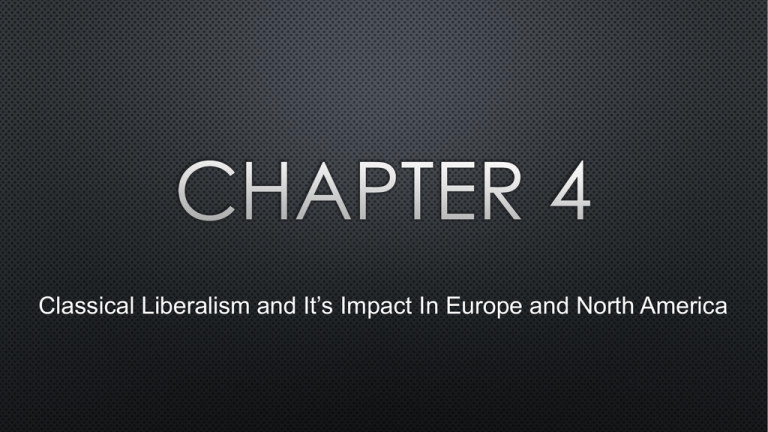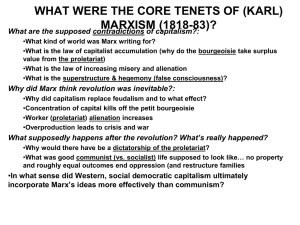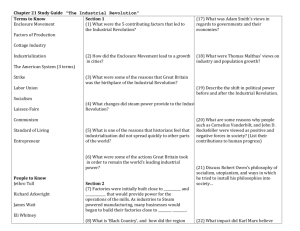006. Chapter 4
advertisement

Classical Liberalism and It’s Impact In Europe and North America The Industrial Revolution made Liberalism and capitalism the dominant force in Europe. Economic changes expanded the middle class and the promise of equal opportunity gave people a chance to improve their standard of living and achieve material gain. The growth of business opportunities and explosion of consumer products led to the belief that capitalism and progress were one and the same. Classical Liberalism and its emphasis on private property, self interest and limited government involvement in the affairs of the economy influenced the development of laissez-faire capitalism (1800’s), which is usually associated with the Industrial Revolution (the transformation from a traditional agricultural economy into an urban, factory system of production and the emergence of large-scale factory production). The industrialization process began in Great Britain and spread throughout Europe. Between 1760-1850, including the late 19th century, major changes to production, manufacturing, transportation, medicine, power and resource industries occurred. The work of the British inventors and capitalists (bankers, factory owners, etc) in the 1800’s provided the strongest argument for laissez-faire capitalism. British capitalists invested large sums of money to purchase machines and create factories in which large-scale production could take place. Vast fortunes were made and the middle class prospered. Industrialization contributed to population growth, the rise of large towns and cities and the development of a new social class structure. The middle class (entrepreneurs, traders, manufacturers, shopkeepers, lawyers, bankers, factory owners, etc) became prominent and benefited most from the economic and material progress. They believed that merit and competition should replace birth and patronage as avenues to social position and political influence. Thrift and hard work were important and they tended to measure success and respectability in terms of wealth and money. Yet for all their economic success they lacked effective political power. (property requirements plus wealth) It was not until the 1830’s in Great Britain that they could vote for members of parliament. The Industrial Revolution did have its problems. Not all members of society shared in the progress. Until governments created legislation to protect the factory workers and improve the living conditions in the cities, life for the new class of industrial workers was demanding. Poor working conditions, low wages, long hours, crowded living conditions, slums, poor sanitation were prevalent in the first phase of the Industrial Revolution. Workers, including children, were exploited while rapid urbanization let to the creation of slums and poor living conditions. In response, new ideologies competed for popular support. Among them were socialism and Marxism. Each ideology attacked the new societal structures. The lives of workers during the Industrial Revolution did not seem like progress to the followers of these ideologies. For some, democracy was not considered capable of solving the problems of the new society. The conservative British statesman Edmund Burke believed that the aims of society and the individual were rarely the same. Political and economic stability, he argued, lay with keeping power in the hands of the upper classes. Karl Marx and other socialists believed that democracy was a tool of the wealthy elite. Democratic rights were restricted to property owners and, as a result, the urban worker was no better off then the rural peasant. Some Key Figures Robert Owen: A social reformer and one of the founders of socialism and the cooperative movement. Owen's philosophy was based on three intellectual pillars: First, no one was responsible for his will and his own actions because his whole character is formed independently of himself; people are products of their environment, hence his support for education and labour reform, rendering him a pioneer in human capital investment. Second, all religions are based on the same absurd imagination, that make man a weak, imbecile animal; a furious bigot and fanatic; or a miserable hypocrite. Third, support for the putting-out system instead of the factory system Jeremy Bentham: an English philosopher and legal and social reformer. He is best known for his advocacy of utilitarianism (the idea that the moral worth of an action is determined solely by its utility in providing happiness or pleasure as summed among all sentient beings.), for the concept of animal rights, and his opposition to the ideas of natural law and natural rights, calling them "nonsense upon stilts." He also influenced the development of welfarism. Bentham became known as one of the most influential of the utilitarians, through his own work and that of his students. Bentham's position included arguments in favour of individual and economic freedom, the separation of church and state, freedom of expression, equal rights for women, the end of slavery, the abolition of physical punishment (including that of children), the right to divorce, and free trade. He also made two distinct attempts during his life to critique the death penalty. Karl Marx: a German philosopher, communist and revolutionary whose ideas are credited as the foundation of modern communism. Marx summarized his approach in the first line of chapter one of The Communist Manifesto, published in 1848: "The history of all hitherto existing society is the history of class struggles." Marx argued that capitalism would inevitably produce internal tensions which would lead to its destruction. Just as capitalism replaced feudalism, he believed socialism would replace capitalism and lead to a stateless, classless society called pure communism. This would emerge after a transitional period called the "dictatorship of the proletariat": a period sometimes referred to as the "workers state" or "workers' democracy". Edmund Burke: an Irish statesman and philosopher who served for many years in the House of Commons of Great Britain as a member of the Whig party. He is mainly remembered for his opposition to the French Revolution. It led to his becoming the leading figure within the conservative faction of the Whig party, which he dubbed the "Old Whigs", in opposition to the pro-FrenchRevolution "New Whigs" led by Charles James Fox. Burke lived before the terms "conservative" and "liberal" were used to describe political ideologies. Burke was praised by both conservatives and liberals in the nineteenth-century and since the twentieth-century he has generally been viewed as the philosophical founder of modern conservatism. Mary Wollstonecraft: An eighteenth-century British writer, philosopher, and feminist. During her brief career, she wrote novels, treatises, a travel narrative, a history of the French Revolution, a conduct book, and a children's book. Wollstonecraft is best known for A Vindication of the Rights of Woman (1792), in which she argues that women are not naturally inferior to men, but appear to be only because they lack education. She suggests that both men and women should be treated as rational beings and imagines a social order founded on reason John Maynard Keynes: A British economist whose ideas have profoundly impacted modern macroeconomics and modern liberalism, both in theory and practice. He advocated interventionist economic policy, by which governments would use fiscal and monetary measures to mitigate the adverse effects of business cycles, economic recessions, and depressions. His ideas are the basis for the school of thought known as Keynesian economics. We will be looking at Keynes and his economic theories in much more detail later in the text. Suffice it to say he is one of the people, along with others such as Adam Smith, Edmund Burke, Karl Marx, and others who you will need to know.







